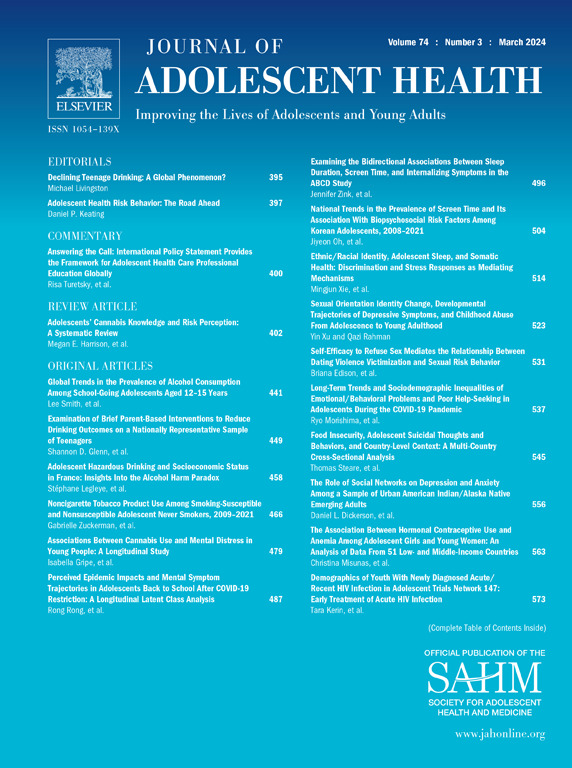青少年临床预防服务中家长对保密性的看法
IF 4.5
2区 医学
Q1 PEDIATRICS
引用次数: 0
摘要
保密是提供高质量青少年临床预防服务的核心。先前的研究表明,父母对保密问题的看法复杂且经常相互矛盾。本研究旨在探讨青少年预防服务中家长对保密的看法及潜在信念。本文章由计算机程序翻译,如有差异,请以英文原文为准。
Parents' Perspectives on Confidentiality in Clinical Preventive Services for Adolescents
Purpose
Confidentiality is central to the delivery of high-quality adolescent clinical preventive services. Previous research documents that parents have complex and often conflicting opinions about confidentiality. This study aims to describe parents' opinions and underlying beliefs about confidentiality in adolescent preventive services.
Methods
This study examined in-depth interviews conducted with a purposive sample of 35 parents in a Midwestern state as part of a larger study of primary care clinicians (PCCs), adolescent patients from their practices, and their parents. Thematic analysis was used to identify themes.
Results
Most parents held mixed opinions of confidentiality. Examination of underlying beliefs yielded multiple themes, including parents' expectations of PCCs, parents' trust in PCCs, parents' perception of the parental role, parent–adolescent relationship qualities, parents' beliefs about adolescent autonomy development, parents' opinions about the appropriate age for confidentiality, and parents' expectations about confidentiality limits. Although all parents expected PCCs to inform them if their child was in danger of harm, opinions varied on when confidentiality should be broken. The data suggested that trust in PCCs and open parent–adolescent relationships increased support of confidentiality, whereas concerns about providing adequate support and seeing adolescents as dependent minors reduced support.
Discussion
Parents have nuanced views on confidentiality. Although most parents acknowledged the need for confidential care, particularly for adolescents who live in unsupportive homes, they also expressed hesitations around confidential care. Findings highlight the importance of PCCs routinely discussing adolescent confidentiality and its limits with parents, addressing their concerns, validating their perspectives, and answering their questions thoroughly.
求助全文
通过发布文献求助,成功后即可免费获取论文全文。
去求助
来源期刊

Journal of Adolescent Health
医学-公共卫生、环境卫生与职业卫生
CiteScore
10.40
自引率
3.90%
发文量
526
审稿时长
46 days
期刊介绍:
The Journal of Adolescent Health is a scientific publication dedicated to enhancing the health and well-being of adolescents and young adults. Our Journal covers a broad range of research topics, spanning from the basic biological and behavioral sciences to public health and policy. We welcome a variety of contributions, including original research papers, concise reports, literature reviews, clinical case reports, opinion pieces, and letters to the editor. We encourage professionals from diverse disciplines such as Anthropology, Education, Ethics, Global Health, Health Services Research, Law, Medicine, Mental and Behavioral Health, Nursing, Nutrition, Psychology, Public Health and Policy, Social Work, Sociology, and Youth Development to share their expertise and contribute to our mission of promoting adolescent health. Moreover, we value the voices of young individuals, family and community members, and healthcare professionals, and encourage them to submit poetry, personal narratives, images, and other creative works that provide unique insights into the experiences of adolescents and young adults. By combining scientific peer-reviewed research with creative expressions, our Journal aims to create a comprehensive understanding of the challenges and opportunities in adolescent and young adult health.
 求助内容:
求助内容: 应助结果提醒方式:
应助结果提醒方式:


